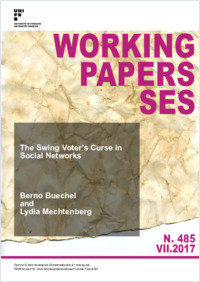The swing voter's curse in social networks
BP2-STS
-
10.07.2017
97
English
We study private communication in social networks prior to a majority vote on two alternative policies. Some (or all) agents receive a private imperfect signal about which policy is correct. They can, but need not, recommend a policy to their neighbors in the social network prior to the vote. We show theoretically and empirically that communication can undermine efficiency of the vote and hence reduce welfare in a common interest setting. Both efficiency and existence of fully informative equilibria in which vote recommendations are always truthfully given and followed hinge on the structure of the communication network. If some voters have distinctly larger audiences than others, their neighbors should not follow their vote recommendation; however, they may do so in equilibrium. We test the model in a lab experiment and find strong support for the comparative-statics and, more generally, for the importance of the network structure for voting behavior.
- Collections
- Faculty
- Faculté des sciences économiques et sociales et du management
- Language
-
- English
- Classification
- Economics
- Other electronic version
- Series statement
-
- Working Papers SES ; 485
- License
-
License undefined
- Identifiers
-
- RERO DOC 305039
- RERO R008688952
- Persistent URL
- https://folia.unifr.ch/unifr/documents/306068
Statistics
Document views: 211
File downloads:
- Document: 316
